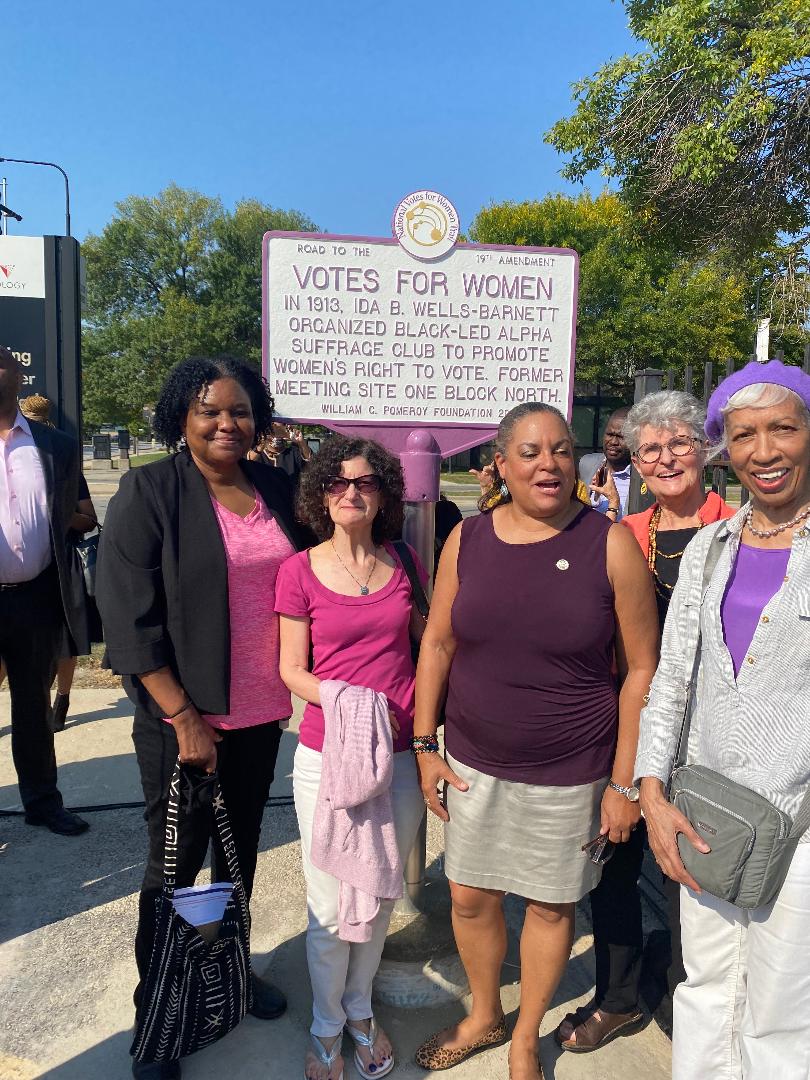
The National Votes for Women Trail Marker honoring the Alpha Suffrage Club was dedicated on Friday, October 1st at 10 am at the corner of 31st and State Street. Founded in 1913 by Ida B. Wells-Barnett and several other suffragists in Chicago, the Alpha Suffrage Club played a significant role in motivating Black women to support voting rights and women’s suffrage. Club members attended the controversial National Woman Suffrage Parade in Washington, D.C, in March of that year and they maintained their activism supporting local and national African American candidates for political office. (See a “A Little More About the Club” from the event program).
Fifty attendees listened to the VanderCook College of Music Choral Choir and to the event speakers. Speakers often paused their talks as passing El trains threatened to drown them out. Attendees did not mind; the fact that the Club was close to the El made it quintessentially “Chicago.”
Dr. Raj Echambadi, President of the Illinois Institute of Technology, opened the marker dedication ceremony. He noted similarities in the strategies of Ida B. Wells-Barnett and Mahatma Gandhi in achieving representation for their people. Michelle Duster, the great-granddaughter of Ida B. Wells spoke, commenting that current efforts in the U.S. to deny voting rights to some people are testimony to how important they are. Lori Osborne of the National Collaborative of Women’s History Sites welcomed the marker, one of the more than 100 in Illinois alone. It was a misconception, she said, to regard Seneca Falls as the only site for women’s suffrage in the U.S. when, in fact, efforts took place all over this country, and the Alpha Suffrage Club was an important example.
After speeches from State Representative “Kam” Buckner and a representative from Alderwoman Pat Dowell, the marker was unveiled and open for photographs. WWHP board members posed in front of the marker with Michelle Duster.
A Little More About the Club
During her remarkable career, Ida B. Wells (later Wells-Barnett) was an educator, journalist, anti-lynching crusader, civil rights activist as well as a suffragist. On January 30, 1913, she founded the Alpha Suffrage Club, the first organization to promote suffrage for Black women in Illinois . The Club met every Wednesday evening in the Reading Room of the Negro Fellowship League at 3005 S. State Street. From the outset, it provided representation for African American women, who had been largely excluded from both the existing local and national suffrage organizations and neglected by the men and churches in their own communities. The Club set out to educate Black and working-class women on civic matters and on the importance of voting rights as a path to the election of African American candidates to political office. Over the next few years, the club members developed their organizational skills, forged an effective political network, and distributed their own newsletter. By 1916, Wells could claim a membership of nearly two hundred members.
Barely three months after its founding, the Alpha Suffrage Club and its president, Ida B. Wells-Barnett also provided representation to Black women at the national level at a parade in Washington D.C., organized by the National American Woman Suffrage Association in March 1913. Wells-Barnett encountered racism within the ranks of the state contingent and from the leadership of the NAWSA, who advised her not to join the Illinois contingent and instead march at the back of the procession to placate white women, especially those from the south. Unsupported by most in her state group, Wells begrudgingly agreed to the slight once two white members agreed to march with her in the back. She later stunned her colleagues by stepping out of the crowd of spectators to join the Illinois contingent, where she marched on, flanked by her two white allies, Belle Squire and Virginia Brooks.
The Alpha Suffrage Club maintained an active presence in Chicago politics, registering African American women to vote in the aldermanic primaries and general election in the city’s second ward (which included today’s Bronzeville neighborhood). While their mayoral candidate did not prevail in the primaries, he only lost by a few hundred votes, drawing the attention of the Republican Party. In the general elections in 1914, the Republicans endorsed Oscar De Priest in the second ward who won against two white candidates and became the first Black alderman to be elected to the Chicago City Council. News of this victory spread to black newspapers nationally who recognized the key role played by Black women in tipping the balance in De Priest’s favor.
After the passage of the Nineteenth Amendment in 1920, Ida B. Wells-Barnett continued to play an active role in mobilizing Black women voters and joined the ranks of African Americans and women pursuing public office when she ran for the Illinois Senate in 1930, a year before her death. Thus, in addition to all her other achievements, she played a crucial role in promoting the status of Black people and women in American political life.
